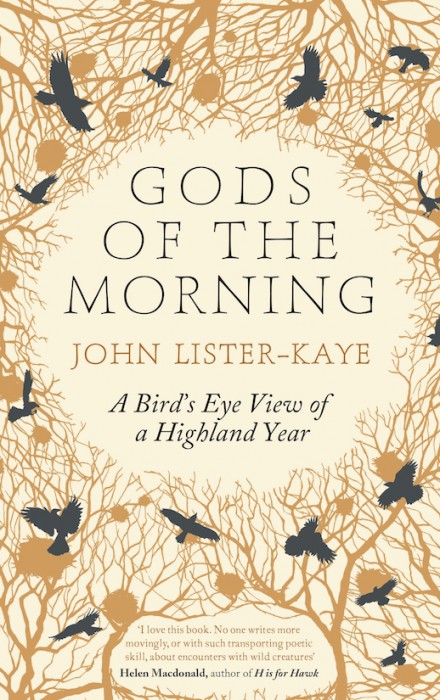Gods of the Morning by John Lister-Kaye.
Canongate, hardback, 304 pages. Published 5 March
Review by Neil Ansell
I would argue that there are two basic types of modern nature writing; books that are the product of research, and of research trips perhaps undertaken primarily for the purpose of writing about them, and books that are observation-based, the natural fruit of long hours spent in the field.
There is no doubt that the books of John Lister-Kaye fall determinedly into the latter camp. For forty years he has been a working naturalist, running the renowned Aigas field study centre in the Highlands of Scotland, and he knows his patch like the proverbial back of his hand. And you are in no doubt when you read his books that you are in the hands of someone who knows exactly what he is talking about. Over the years he has written a series of books that share his accumulated knowledge and his appreciation of the world he inhabits.
In Gods of the Morning Lister-Kaye distils this hard-won wisdom into an account of a single Highland year, tracking the local wildlife through the changing seasons. The wildlife he depicts includes pine martens and roe deer, even gossamer spiders, but the primary focus is on his ‘gods of the morning;’ the birds. The book is by no means a survey of everything that is there to be seen, rather the author focuses his attention on a range of species that carry personal meaning for him; blackcaps and buzzards, rooks and owls, whooper swans and treecreepers, among others.
While scientifically rigorous, his passion for his subject may lead him to a sudden burst of irrepressible and irresistible lyricism. Here he is, on the migration of the blackcap:
I find it hard to believe that this little scrap of ashen feathers I held in my hand last autumn had made it all that way and back again, possibly several times…I am dazzled. That tiny pulsing heart, those fluttering wings, the beady eyes scanning the land beneath, and that fizzing brain no bigger than my little fingernail, all perfectly in sync, like a tiny electric toy. All driving, pushing, steering, navigating, eyeing up the stars, sharp little bill thrust into the wind, skimming across seas, weaving through woods, fields, gardens and parks, orchards, vineyards and olive groves, flickering over mountains and dales, skirting great lakes and snatching a roost and a rest wherever strength and energy supplies demand.
Nature is not constant; it is in a state of continual flux. The ranges of different species contract and expand in response to environmental factors that might otherwise be too subtle for us to notice. A single visit would never tell you this, it may take years of painstaking observation to begin to see what is really happening. This is the work of the naturalist, the steady accretion of knowledge and understanding, one observation at a time.
Birds, the most visible and most studied of our wildlife, are the bellwether of this kind of change – the canary in the coalmine. Lister-Kaye writes with infectious joy about the wildlife that he knows and loves, but as we follow him through the course of a year we become increasingly aware that all is not well. The seasons are out of kilter; they come too early, or too late. There are droughts and floods, big storms and big freezes. And nature is struggling to come to terms with the increasing unpredictability of our climate. The rate of natural change has begun to increase exponentially.
Gods of the Morning is by no means a despondent book, or a depressing one. It is not a polemic, and Lister-Kaye does not harp on about his concerns; rather he just tells it as he sees it. His endless curiosity and constant fascination with the natural world around him read more as love story than as tragedy. What I hope the reader will take away from this book is a greater appreciation of the natural world, and of just how much we have to lose.
Gods of the Morning can be bought from the Caught by the River shelf at Rough Trade
Neil Ansell on Caught by the River
